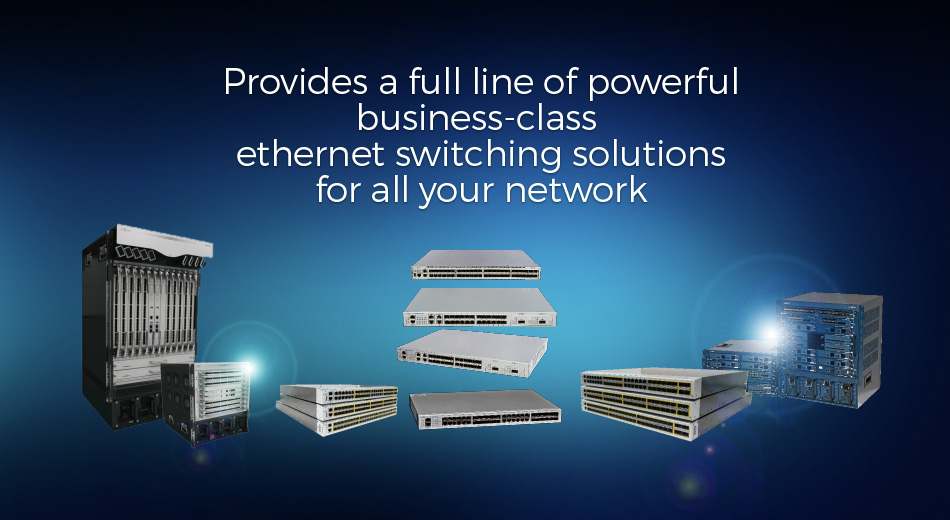SWITCHES
OUR COMPANY HAS A DREAM AND VISION OF ALL IP CONVERGENCE
 A switch is a device in a computer network that electrically and logically connects together other devices. Multiple data cables are plugged into a switch to enable communication between different networked devices. Switches manage the flow of data across a network by transmitting a received message only to the one or more devices for which the message was intended. Each networked device connected to a switch can be identified using a MAC address, allowing the switch to regulate the flow of traffic. This maximizes the security and efficiency of the network.
A switch is a device in a computer network that electrically and logically connects together other devices. Multiple data cables are plugged into a switch to enable communication between different networked devices. Switches manage the flow of data across a network by transmitting a received message only to the one or more devices for which the message was intended. Each networked device connected to a switch can be identified using a MAC address, allowing the switch to regulate the flow of traffic. This maximizes the security and efficiency of the network.
Essentially, when replacing a repeater hub with an Ethernet switch, the single large collision domain is split up into smaller ones, reducing the probability and scope of collisions and, as a result, increasing the potential throughput. Because broadcasts are still being forwarded to all connected devices, the newly formed network segment continues to be a broadcast domain.
Due to these features, a switch may be seen as more "intelligent" than a repeater hub, which simply retransmits messages out of every port of the hub but the receiving one, unable to distinguish different recipients, and greatly degrading the overall efficiency of the network.
ubiQuoss provides a full line of powerful, business-class ethernet switching solutions for all your network needs. Perfect for SMB and multi-site enterprise networks, ubiQuoss Ethernet Switches address today’s highest networking priorities from bandwidth expansion and VoIP migration, to network security. Choose from managed Core/edge, Aggregation, Access Switch product lines. Our ethernet switches are differentiated by their security, ease-of-use, and management features like MAC-based port security and cable diagnostics.
Core/Edge Switches
The ubiQuoss Core/edge switches simplify the architecture for Enterprise IT managers have limited time or resources to deal with overly complex, specialized network infrastructure solutions. Purpose-built core, aggregation, edge and Data Center modules can meet the chassis needs across network. Traditional three-tier architectures can be replaced with a streamlined two-tier network that reduces management overhead, operational complexity and capital expenditures.
The ubiQuoss Core/edge switches deliver voice-class availability, Gigabit Ethernet, and 10 Gigabit Ethernet wherever it’s needed. They serve well as a high-performance Enterprise core. The non-blocking ports interconnect thousands of servers for High Performance Cluster Computing (HPCC) and data center applications. A full range of Layers 2 and Layer 3 features for IPv4 and IPv6 allow the aggregation of high-speed connections, eliminating bottlenecks between edge and core. ubiQuoss Core/edge switches fit well at the edge of the most demanding enterprises switching Voice-over-IP (VoIP), video, wireless and data traffic.
Aggregation Switches(Layer3)
Within
the LAN environment, a Layer 3 aggregation switch makes intelligent switching
decisions based on the Layer 3 source and destination addresses, similar to that
of a router. A standard Layer 2 switch relies on the MAC addresses to make
switching decision. The fundamental difference between the two, is that a Layer
3 aggregation switch offers more performance compared to a standard Layer 2
switch.
The ubiQuoss Layer 3 aggregation switches combine performance, reliability and
security. These switches are perfect for Gigabit to the desktop applications or
as an aggregator switch routing between VLANs, therefore segmenting data and
voice and offering additional security.
Access Switches(Layer2)
The
ubiQuoss Access Switches includes full-featured, managed, Layer 2 and Gigabit
Ethernet, and Power Over Ethernet switches.
Gigabit Ethernet Switches
provides affordable, higher capacity switching for Gigabit-to-the-desktop
applications and PoE. The Gigabit Ethernet switch is available from 8 to 24
ports and features 1G or 10G uplink capabilities for both multi-floor and
campus aggregation switching needs that demand multi-layer, wire-speed
switching capacity.
Business-class features, flexible management, and a favorable price point set
these switches apart from all other switches in their category.
The ubiQuoss Acccess solutions are perfect for Small- and Medium-sized Businesses (SMBs) or multi-site enterprise networks. These solutions address highest networking priorities, from bandwidth expansion to network security.
High density 25G Switch
Overview
The ubiQuoss E7124 is a high density L3 switch with 1/10/25GE ports which is predictably cost effective. This pizza box type switch is designed to be placed in Telco's Central Office or IDC/CDC to aggregate and distribute high bandwidth data traffic.
The E7124 also provides 40/100GE uplink ports and delivers up to 2Tbps of switching capacity. This switching solution uses a shared 32MB smart packet buffer to handle packet queueing in case of interface congestion.
The E7124 can be also deployed at 5G cell site backhaul while supporting IEEE 1588v2 BC/TC for Time Sensitive Network.
The E7124 has all the essential features of layer 3 software packages that can be found among other L3 switches whereas meeting the basic requirements like system reliability and software upgradability.
Besides from the compact design, the E7124 operates with low power consumption and effective cooling airflow so that it can be suitably placed in a compact environment.
Features of E7124
● 19 inch Rack mount type switch
● 24 ports x 1/10/25GE
● 4 uplink ports x 40/100GE
● Switching Fabric: 2Tbps
● IP-MPLS
● EVPN
● Segment Routing, TI-LFA
● SDN (NetConf)
● Low Latency
● SyncE, 1588v2 BC/TC
● SNMP v1/v2/v3, RMON, MIB


 Oversea Sales +82-70-4865-0565
Oversea Sales +82-70-4865-0565